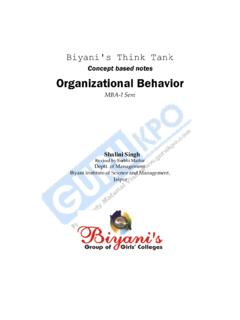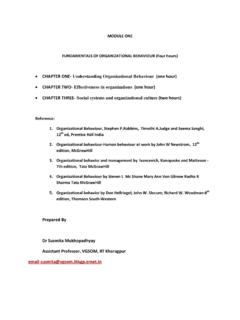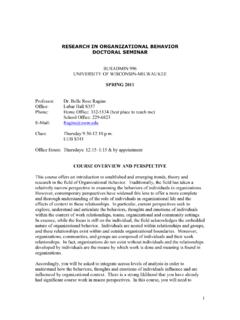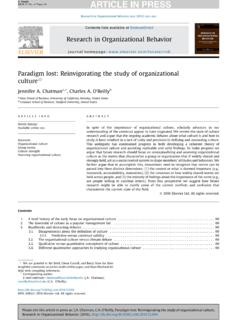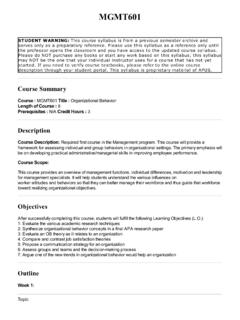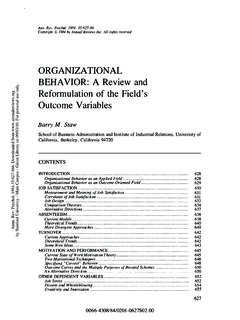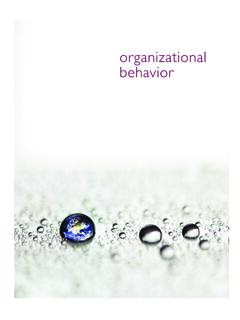Transcription of ORGANIZATIONAL BEHAVIOR: INTEGRATING ... - bayanbox.ir
1 While there are many ORGANIZATIONAL texts available to the instructor, JosephChampoux s sets itself apart through its organization. Although the expositionis the traditional micro to macro presentation, Champoux s unique integrationof content gives the student a more effective presentation of the importance ofindividual behavior as it pertains to the employee and the organization as a E. Champouxis a Regents Professor of Management Emeritus at theRobert O. Anderson School of Management of the University of New Mexico,USA. Champoux earned a and at San Diego State University and in Administration at the University of California, Irvine. Champoux hastaught in France, the Netherlands, Austria, Mexico, and Brazil.
2 Champoux haspublished 29 articles in journals such as Decision Sciences, Academy ofManagement Journal, Human Relations, Administrative Science Quarterly,Journal of Management Education, Journal of Management Inquiry, PersonnelPsychology, and the Journal of ORGANIZATIONAL behavior . He has authored orco-authored 16 book chapters and 30 print or electronic books. His currentresearch activities focus on film as a teaching resource. He is examining variousfilm genres for scenes that show ORGANIZATIONAL behavior and managementconcepts. Champoux continues to develop film-based teaching materials,including online film :INTEGRATINGINDIVIDUALS,GROUPS, ANDORGANIZATIONSJ oseph E.
3 ChampouxFourth EditionFirst published in 1996 by West Publishing CompanySecond edition published in 2004 by South-Western College PublishersThird edition published in 2006 by ThomsonThis fourth edition first published 2011by Routledge270 Madison Avenue, New York, NY 10016 Simultaneously published in the UKby Routledge2 Park Square, Milton Park, Abingdon, Oxon OX14 4 RNRoutledge is an imprint of the Taylor & Francis Group, an informa business 1996 West Publishing Company 2004 South-Western College Publishers 2006 Thomson 2011 Taylor & FrancisThe right of Joseph Champoux to be identified as author of this work has been asserted byhim in accordance with sections 77 and 78 of the Copyright, Designs and Patents Act rights reserved.
4 No part of this book may be reprinted or reproduced or utilised in anyform or by any electronic, mechanical, or other means, now known or hereafter invented,including photocopying and recording, or in any information storage or retrieval system,without permission in writing from the Notice: Product or corporate names may be trademarks or registered trademarks,and are used only for identification and explanation without intent to of Congress Cataloging in Publication DataChampoux, Joseph E. (Joseph Edward) ORGANIZATIONAL behavior : INTEGRATING individuals, groups, and organizations / JosephChampoux. 4th ORGANIZATIONAL behavior . I. Title. '5 dc222010000119 ISBN13: 978-0-415-80463-9 (hbk)ISBN13: 978-0-415-80464-6 (pbk)ISBN13: 978-0-203-87291-8 (ebk)This edition published in the Taylor & Francis e-Library, purchase your own copy of this or any of Taylor & Francis or Routledge scollection of thousands of eBooks please go to 0-203-87291-6 Master e-book ISBNTo Linda, Jean-Marc, Jean-Andr , Suzanne Nicole, and Blaise.
5 Je vous aime OF CONTENTSIN BRIEFPART 1: INTRODUCTION: THE CONTEXT OF MODERN ORGANIZATIONAL behavior AND MANAGEMENTC hapter 1:Introduction and Historical Background4 Chapter 2:The Context of Modern Organizations (Diversity, Quality,Technology, International)27 Chapter 3:Ethics and behavior in Organizations50 Chapter 4: ORGANIZATIONAL Culture72 PART 2: INDIVIDUAL PROCESSES IN ORGANIZATIONSC hapter 5:Perception, Attitudes, and Personality100 Chapter 6: ORGANIZATIONAL Socialization126 Chapter 7:Motivation: Need Theories151 Chapter 8:Motivation: Cognitive and Behavioral Theories and Techniques171 Chapter 9:Intrinsic Rewards and Job Design196 PART 3: GROUP AND INTERPERSONAL PROCESSES IN ORGANIZATIONSC hapter 10: Groups and Intergroup Processes232 Chapter 11: Conflict in Organizations264 Chapter 12: Leadership and Management286 PART 4: ORGANIZATIONAL PROCESSESC hapter 13: Communication Processes320 Chapter 14: Decision-Making and Problem-Solving Processes345 Chapter 15: Power and Political Behavior371 Chapter 16: Stress in Organizations394 PART 5: ORGANIZATIONAL DESIGN AND ORGANIZATIONAL CHANGEC hapter 17: ORGANIZATIONAL Design430 Chapter 18: ORGANIZATIONAL Change and Development454viii TABLE OF CONTENTS IN BRIEFTABLE OF CONTENTSIN DETAILP refacexixPART 1: INTRODUCTION.
6 THE CONTEXT OF MODERN ORGANIZATIONAL behavior AND MANAGEMENTC hapter 1:Introduction and Historical Background4 What Is an Organization?6 ORGANIZATIONAL behavior and ORGANIZATIONAL Theory6 Theories and Concepts7 Theory8 Theories and Concepts as Lenses8 Functional Analysis9 Historical Foundations10 Division of Labor: Adam Smith (1776)10 Scientific Management: Frederick W. Taylor (1911)11 Toward a Theory of Administration: Henri Fayol (1919)12 Bureaucracy: Max Weber (1922)13 Mary Parker Follett s Observations on Organizations and Management (1925)14 The Functions of the Executive: Chester I. Barnard (1938)16 The Hawthorne Studies (1939)17 Theory X and Theory Y: Douglas McGregor (1960)18 Management Guru: Peter F.
7 Drucker (1995)19 Summary21 Chapter 2:The Context of Modern Organizations (Diversity, Quality,Technology, International)27 Workforce Diversity28 Quality Management31 Technology, Organizations, and Management35 The Global Environment of Organizations38 Summary41 Chapter 3:Ethics and behavior in Organizations50 Ethical and Unethical Behavior52 It s Good Business 53 Ethical Issues in ORGANIZATIONAL Behavior53 Ethics: The Study of Moral Philosophy54 Ethical Values of Societies and Individuals54 Ethical Values of Societies54 Ethical Values of Individuals55 Ethics Theories57 Utilitarianism57 Rights59 Justice60 Egoism61 Managing for Ethical Behavior61 International Aspects of Ethics63 Legal Views63 Ethical Views64 Summary65 Chapter 4.
8 ORGANIZATIONAL Culture72 Dimensions of ORGANIZATIONAL Culture74 Levels of ORGANIZATIONAL Culture75 Perspectives on ORGANIZATIONAL Culture76 Cultural Symbolism77 Functions of ORGANIZATIONAL Culture77 Dysfunctions of ORGANIZATIONAL Culture79 Diagnosing ORGANIZATIONAL Culture80As an Outsider80As an Insider82 ORGANIZATIONAL Culture and ORGANIZATIONAL Performance83 Creating, Maintaining, and Changing ORGANIZATIONAL Culture84 International Aspects of ORGANIZATIONAL Culture86 Ethical Issues in ORGANIZATIONAL Culture86 Summary87 Part 1 Case: Does this Milkshake Taste Funny?PART 2: INDIVIDUAL PROCESSES IN ORGANIZATIONSC hapter 5:Perception, Attitudes, and Personality100 Perception101 Self-Perception: A View of Self102 Social Perception: A View of Others103x TABLE OF CONTENTS IN DETAILA ttitudes106 Attitude Formation107 Attitude Change107 Personality108 Personality Theories108 Emotions and Emotional Intelligence110 The Big Five Personality Dimensions112 Personality Types113 International Aspects of Perception, Attitudes, and Personality114 Ethical Issues in Perception, Attitudes, and Personality115 Summary116 Chapter 6.
9 ORGANIZATIONAL Socialization126 Roles and Role Behavior128 Role Episodes128 Boundary Transitions130 Individual and ORGANIZATIONAL Perspectives on Socialization131 Stages of ORGANIZATIONAL Socialization132 Choice: Anticipatory Socialization ( Getting In )132 Entry/Encounter ( Breaking In )134 Change: Metamorphosis ( Settling In )137 Individual Differences and Socialization139 International Aspects of ORGANIZATIONAL Socialization140 Issues in Expatriate Adjustment140 Issues in Repatriate Adjustment141 Ethical Issues in ORGANIZATIONAL Socialization142 Summary143 Chapter 7:Motivation: Need Theories151 Overview of Where We Are Headed152 Murray s Theory of Human Personality:The Concept of Needs153 Characteristics of Needs154 Implications of Murray s Theory for behavior in Organizations155 Maslow s Hierarchy of Needs Theory157 McClelland s Achievement Motivation Theory159 Herzberg s Motivator Hygiene Theory162 International Aspects of the Need Theories of Motivation163 Ethical Issues and the Need Theories of Motivation164 Summary165 Chapter 8:Motivation.
10 Cognitive and Behavioral Theories and Techniques171 Expectancy Theory172 TABLE OF CONTENTS IN DETAIL xiBasic Concepts of Expectancy Theory173 Relationships between Expectancies and Valences174 Types of Outcomes174 Individual and ORGANIZATIONAL Blockages175 Equity Theory176 Goal-Setting Theory179 behavior Modification181A Method of behavior Modification181 Side Effects of Punishment184 International Aspects of the Cognitive and Behavioral Theories of Motivation185 Ethical Issues and the Cognitive and BehavioralTheories of Motivation186 Summary187 Chapter 9:Intrinsic Rewards and Job Design196 Intrinsic Rewards and Job Design197 The Job Characteristics Theory of Work Motivation198 Affective and Behavioral Outcomes198 Critical Psychological States200 Perceived and Objective Job Characteristics200 Relationships Predicted by the Theory202 Contextual Factors in Job Design204 ORGANIZATIONAL Design and Job Design204 Technical Process and Job Design205 Management behavior and Job Design205 Diagnosing and Redesigning Jobs206 Group-Based Job Design206 Design of the Task and the Group207 What Are the Expectations for Group-Based Jobs?











